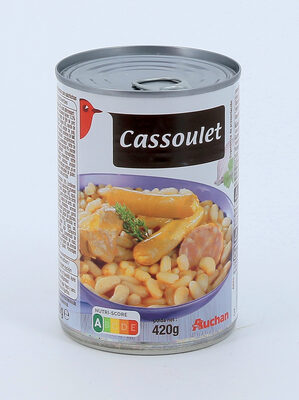
Barcode: 3254560070486
Cassoulet
HARAM
📝 Reason: The product contains several Haram ingredients, including pork meat and lard, which are explicitly prohibited in Islam (Quran 5:3). Despite some Halal ingredients, the presence of Haram components makes the entire product Haram. Natural flavorings without specific sourcing information are marked as Doubtful, adhering to the principle of caution in Islamic dietary laws.
🏷️ Category: Seafood, Canned Foods, Meals, Meats And Their Products, Meals With Meat, Bean Dishes, Canned Meals, Shellfish, Cassoulets
📄 Certificates: Nutriscore, Nutriscore Grade A
Ingredients:
Details
Understanding the Halal Status of Cassoulet
Cassoulet, a hearty French dish, has captivated many with its rich flavors and comforting texture. However, for those of the Islamic faith, understanding its Halal status is crucial. This post will explore the ingredients in Cassoulet to clarify why it is considered Haram.
Halal Status Overview
While Cassoulet includes some ingredients that are Halal, its overall status is classified as Haram. This classification primarily stems from the presence of prohibited components such as pork meat and lard. Islamic dietary laws (as outlined in the Quran, 5:3) explicitly prohibit these elements, making the entire dish non-compliant with Halal guidelines.
The Ingredients Breakdown
Let’s examine the ingredients found in Cassoulet to understand their implications on its Halal status:
- Water: Always Halal and universally accepted.
- Precooked White Beans: Plant-based, making it Halal.
- Calcium Chloride (E509): A mineral salt that is Halal.
- Smoked Sausages and Salamis: These contain pork, thus rendered Haram.
- Cured Pork Meat: Another Haram component from the pig.
- Double Concentrated Tomato Paste: Plant-based ingredient and Halal.
- Corn Starch: Derived from corn, this is Halal.
- Lard: A fat derived from pork and unquestionably Haram.
- Natural Spice Flavorings: The origin of these flavorings is uncertain. Without clear sourcing, their Halal status is doubted.
- Yeast Extract: Typically Halal and safe for consumption.
- Salt: Halal by nature.
- Natural Bay Leaf Flavoring: Plant-based and Halal.
- Natural Thyme Flavoring: Halal as it is plant-derived.
- Natural Nutmeg Flavoring: Also Halal due to its plant origin.
Why Cassoulet is Considered Haram?
The inclusion of pork meat products in Cassoulet drives its classification as Haram. Muslims are at risk of consuming something that is explicitly prohibited by their faith, which is outlined in the Quran. Although there are Halal ingredients in this dish, the presence of Haram elements overshadows them. Furthermore, the natural flavorings are subjected to scrutiny. Unless the source of these flavorings is confirmed as Halal, they remain under the banner of ‘doubtful.’ This cautious approach is essential for consumers mindful of Halal dietary laws.
Brand and Certification Context
Cassoulet generally falls under various categories such as Seafood, Canned Foods, Meats and Their Products, and Meals with Meat. But it’s essential for buyers to check labels carefully. While certain brands may be certified with Nutriscore, for example, a Nutriscore Grade A, this pertains to nutritional quality and does not address Halal concerns. The Nutriscore certification does not have relevance regarding pork content or Halal certification, so it cannot be the sole factor determining whether a product is permissible for Islamic dietary consumption.
Conclusion
In conclusion, Cassoulet is not a Halal product due to the inclusion of products derived from pork, namely cured pork meat and lard. It is vital for Muslims to avoid this dish to adhere to their dietary laws. Always consider scrutinizing ingredient labels and conducting thorough research to ensure compliance with Halal standards. By being observant and informed, you can uphold your dietary principles while enjoying a diverse range of food options.

